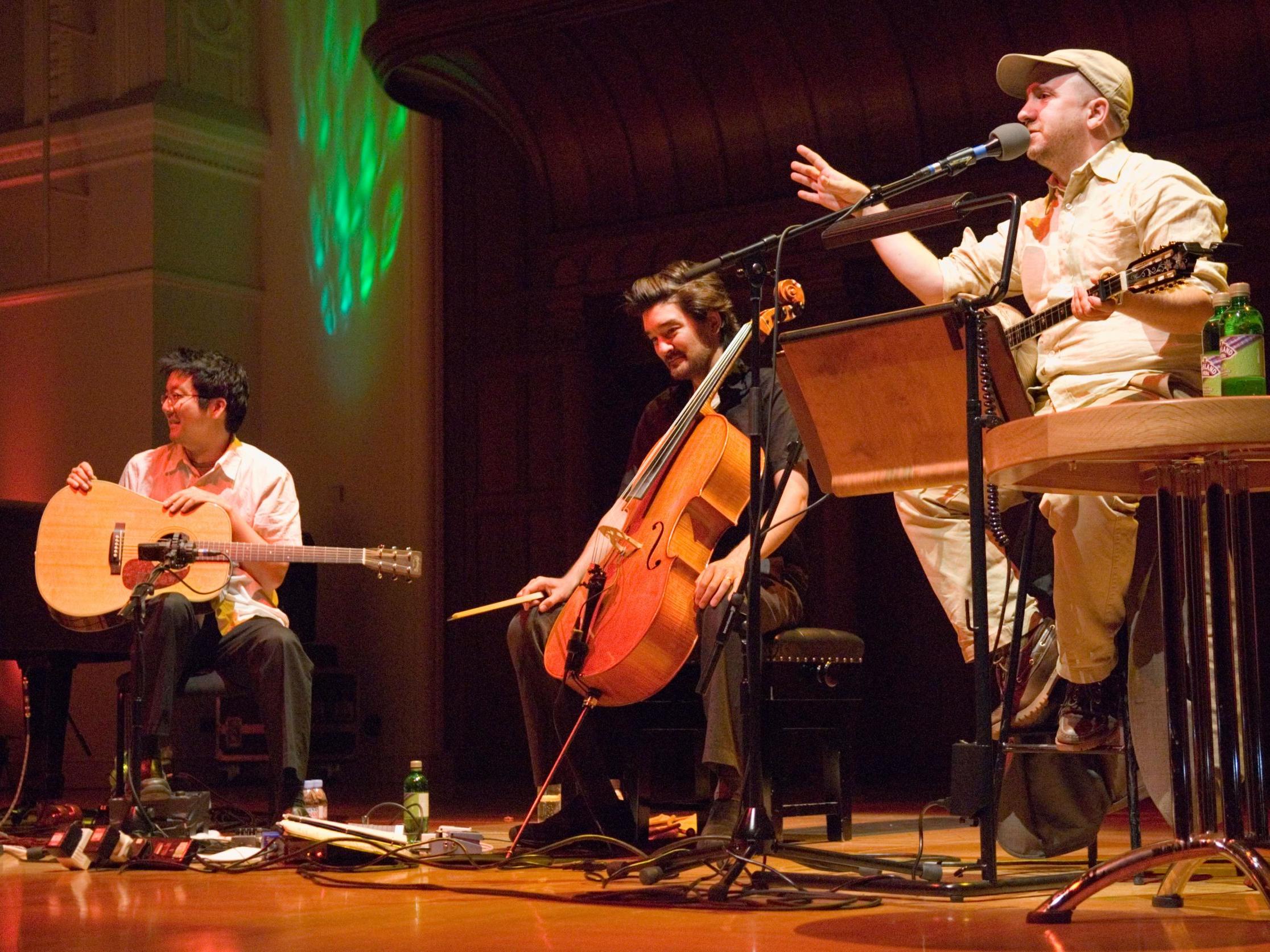How 69 Love Songs by The Magnetic Fields helped me through heartbreak, one emotional sucker punch at a time
In our weekly celebration of albums, Helen Brown explains why ‘69 Love Songs’, despite its deliberate inauthenticity, was a life raft in times of melancholy and rage


Anybody whose partner of 10 years walks out without warning is likely to feel a bewildering rattle bag of emotions. If that partner leaves you alone in a relatively new town, with 24/7 care of two small children shortly to be diagnosed with ADHD and autism, those emotions can scatter and collide like marbles in a locked room. Anger crashes into despair and confusion with weird giddy rolls of euphoria and glassy moments of deadened inertia.
When this happened to me, in September 2013, I turned to an extraordinary album that helped reflect and dissect the whole experience. Released in 1999, 69 Love Songs is a brilliant, sprawling, three-part record by The Magnetic Fields, the lo-fi indie collective formed in 1989 by Boston-born, New York-based songwriter Stephin Merritt with a revolving cast of male and female vocalists (plus author Lemony Snicket on accordion). Early albums included tributes to Phil Spector, the BBC Radiophonic Workshop and Cole Porter. Pop snobs loved the layers of reference: the songs were always about songs.
A caustic and cerebral character (so relentlessly condescending that I gave up interviewing him in 2008), Merritt originally conceived the band’s sixth release as a Sondheim-indebted theatrical revue for four drag queens. The subject, he says, is not love, but love songs. With all the cynical wit of a modern Dorothy Parker, he planned to pick apart all the cliches of the canon while showcasing his ability to mass produce catchy melodies like a vintage Brill Building jangler.
To keep things fresh across almost three hours of music, Merritt dressed his ditties in every genre going: folk, rock, country, indie, gospel, punk, jazz, synth-pop and little outbursts of daft experimentalism. The use of different singers, flipping gender and register, keeps you on your toes. Who’s playing what game now? Who’s telling the truth and who’s lying to you?
Merritt threw every sentimental trick in the book at this record: big swoops and swirls up and down the octave, tear-jerking minor chords, and an attic full of sepia-tinged pop-culture references. One song finds an abandoned spouse seeking refuge in dreams staged by the legendary Hollywood choreographer Busby Berkeley: “Whining and pining is wrong and so/ On and so forth, of course of course/ But no, you can’t have a divorce”. Another spurned lover seeks solace in his Billie Holiday records: “Some of us can only live in songs of love and trouble/ Some of us can only live in bubbles”. This pretty tune is offset by a suicidal mindset and a discordant piano.
Each of Merritt’s emotional sucker punches is delivered with one eyebrow raised at listeners who buy into his “fraudulent authenticity”. This means that anybody going through a traumatic experience can use the music to flush out all the messy feelings – or consider them from a strangely dispassionate distance. “The book of love has music in it/ In fact, that’s where music comes from/ Some of it is just transcendental/ Some of it is just really dumb”, he sings in a bone-dry baritone, over a guitar that sounds like he’s strumming it with a nail brush.
In the weeks directly after my partner left, I struggled to rock my one-year-old daughter to sleep while repeatedly herding my four-year-old son back into his bedroom. My tears would splash onto his Hungry Caterpillar duvet as I sang along with the romantic lullaby tune of “Come Back from San Francisco”, sung by Shirley Simms in a rich, open alto. The part of me that joined Merritt in observing the feelings from afar had nothing but contempt for a woman who yearned for the return of a man who could do this to her.
Although almost all the widely cherished songs on 69 Love Songs are delivered like demos, few have been covered. Despite the catchy, FM-friendly melodies and delectable lyrics, they’re so perfect as they are that to flesh them out would be as crass as daubing Dulux over ancient Greek statues. The spaces in the production are reminiscent of the unanswered questions at the end of a good short story. Some days I find the countryfied electric guitar of “No One Will Ever Love You Honestly” gains truth as it echoes. Other days it’s just a bitter thought dissolving.

After a year of battling through alone, I dumped the melancholy and got angry. Again, 69 Love Songs offers plenty of outlets for rage. When my son found my engagement ring stuffed into the back of a drawer, I played “How F***ing Romantic”: “What a tacky sunset/ What a vulgar moon/ Play another charming/ Rogers and Hart tune...”
Enjoy unlimited access to 100 million ad-free songs and podcasts with Amazon Music
Sign up now for a 30-day free trial. Terms apply.
ADVERTISEMENT. If you sign up to this service we will earn commission. This revenue helps to fund journalism across The Independent.
Enjoy unlimited access to 100 million ad-free songs and podcasts with Amazon Music
Sign up now for a 30-day free trial. Terms apply.
ADVERTISEMENT. If you sign up to this service we will earn commission. This revenue helps to fund journalism across The Independent.
I went to therapy where a smiling woman in a series of jolly cardigans helped me see that the signs had been there from the beginning. She made me aware that patterns in life – as in song – tend to repeat themselves. My ex’s father left his mum when he turned four. My ex left a few weeks after our son turned four. I went home and played “Absolutely Cuckoo”, with its cautionary tale about falling for damaged people.
The cardigan therapist was a great antidote to the terrible couples counsellor with whom we had a few sessions directly after my ex had left, in an attempt to find a peaceful way forward. This man took my ex to pieces in our joint session. But later, in private, he did the same to me. My career, my craven willingness to financially support my ex through his years of professional training, had apparently “emasculated him”. This therapist was called Mike and so he chimed perfectly with the album’s glorious duet “Papa was a Rodeo”, which went: “I like your twisted point of view, Mike/ I like your questioning eyebrow”.
The more I recovered, the more I enjoyed the comedy break-up songs. Merritt’s sepulchral tones on “I Don’t Want to Get Over You” made me hoot. Too busy fixing washing machines and meeting concerned teachers, I had certainly never been through a period during which I could “dress in black and read Camus/ Smoke clove cigarettes and drink vermouth/ Like I was 17/ That would be a scream/ But I don’t want to get over you...”
I was all too ready to get over being sad and angry and tired. 69 Love Songs helped me see through the equal fraudulence of schmaltz and cynicism. And now my kids are old enough to love the album, too. My son actually used a line – “My heart’s running round like a chicken with its head cut off!” – to explain his ADHD to a paediatrician last year.
I’m sure Merritt would have nothing but disdain for how we love his calculated work of deliberate inauthenticity. But he’ll have to suck it up. Because I see his raised eyebrow, and raise mine back.
Join our commenting forum
Join thought-provoking conversations, follow other Independent readers and see their replies
Comments
Bookmark popover
Removed from bookmarks